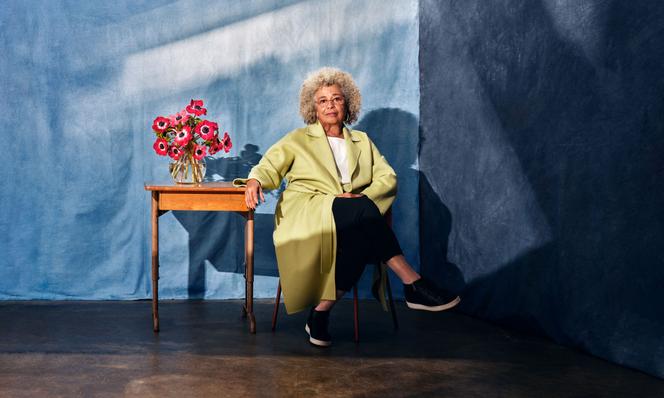


When she was 26, her portrait lined the walls of millions of teenage bedrooms. It was 1970, the Black Panther activist had just been arrested and charged with conspiracy to murder, and the entire intellectual left was mobilizing in her favor. Fifty-three years on, Angela Davis continues to fill conference rooms, with a reception worthy of a rock star. On Sunday, November 19, when she was invited by the Festival d'automne in Paris, a packed Théâtre de la Ville had to wait a full two minutes of applause before her "conversation" with art historian Elvan Zabunyan could begin. Once the two-hour debate was over, a throng of admirers including many young Black women sporting afro hairstyles crowded around her.
Behind the revolutionary activist of the 1970s lies the academic, philosophy professor and leading thinker on political and social activism. Author of 11 books, in addition to her celebrated autobiography written at the age of 30, she has devoted her life to anti-racism, feminism, improving prison conditions, fighting police violence, and criticizing capitalism and the limits of democracy.
Three hours earlier, she gave an interview to Le Monde recounting a life of struggle, the story of an "ordinary person" turned icon.
... If people all over the world had not come to my aid when I was arrested in 1970 and charged with offenses that could have meant that I received the death penalty. So literally, I would not be here had it not been for the fact that people here in France, in the United States, all over Europe, in Africa and Asia and Latin America and the Caribbean and Australia, if they had not come together and demanded what was considered impossible at that time; that is to say, to thwart the will of people like Ronald Reagan, who was the governor of California at that time, Richard Nixon, who was the president of the United States, and J. Edgar Hoover, who was the head of the FBI.
So I have to recognize that if not for the emergence and the organizing of that movement, if not for the actions of vast numbers of people, many of whom I will never have the opportunity to meet, I would not be sitting here today. And I want to point out that when I was in jail 50 years ago and my sister came to Paris, she participated in a demonstration that was led by Louis Aragon and a lot of other prominent French writers, artists, intellectuals and vast numbers of people. So I will be forever grateful to the people of France.
You have 90% of this article left to read. The rest is for subscribers only.
